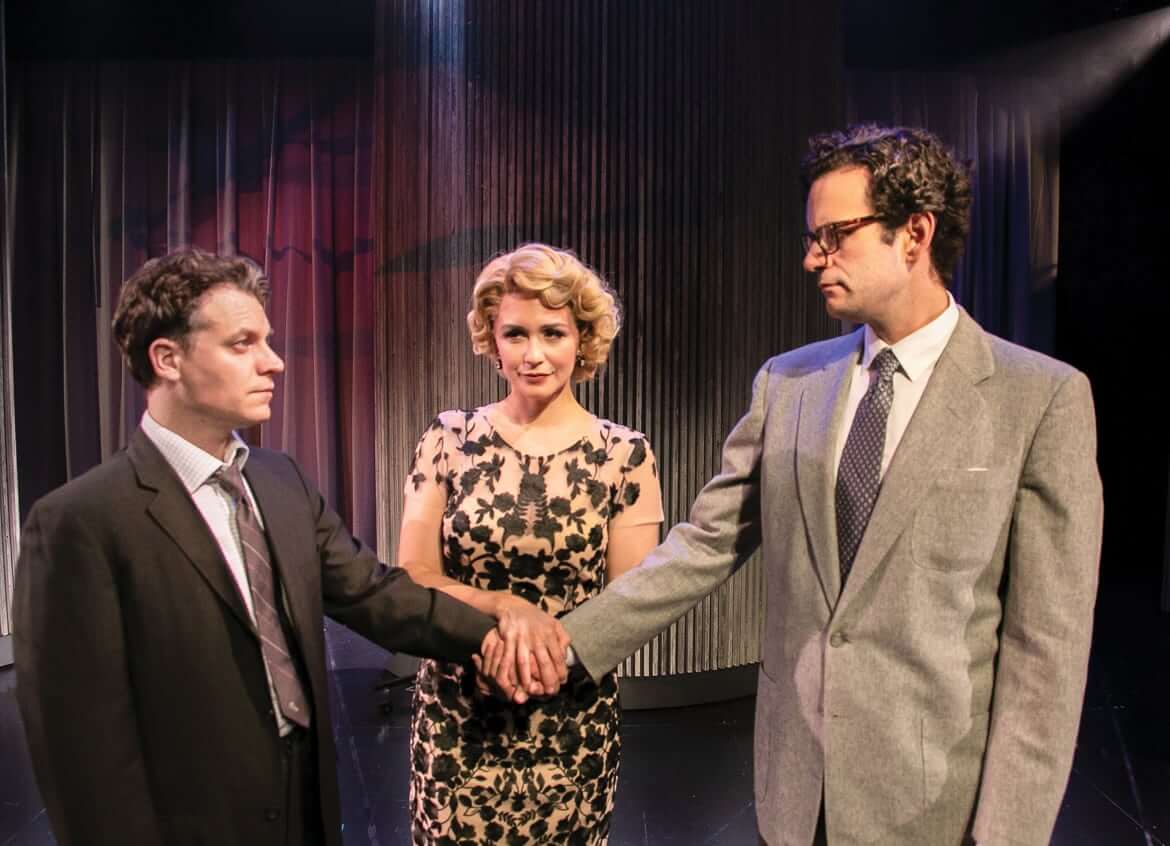Miller, Monroe, Kazan In Strong Debut

Jack Canfora’s world premiere play, Fellow Travelers, directed by Michael Wilson, kicked off Bay Street Theater’s summer season on Saturday with a punch to the gut.
It is a powerful production that captures the paranoia rampant in Hollywood during the House Un-American Activities Committee’s hearings, as told through the bromance between playwright Arthur Miller and director Elia Kazan, and the woman who acted as both their buffer and their bond, Marilyn Monroe.
At the heart of Fellow Travelers — the appellation given to communist sympathizers by HUAC — is the tale of a battered friendship between two geniuses of the entertainment industry who loved and appreciated each other. Miller (Wayne Alan Wilcox) had already been awarded the Pultizer for Death of a Salesman when he accompanied his buddy Kazan (Vince Nappo) to the West Coast to discuss a possible film, The Hook, with Columbia Pictures head Harry Cohn (Mark Blum).
From the first scene it is clear that the two see things differently — Kazan uses images and symbolism to tell stories; Miller uses words. Gadge (Kazan’s nickname) knows how to play the game, while Art is sincere and serious. They both form a friendship with Monroe (Rachel Spencer Hewitt), who is in love with, and eventually marries, Art but engages in a long-term sexual liaison with Kazan because they’re friends who see things the same way, and they both understand that sex is just another film industry commodity.
When Cohn and Roy Brewer (Jeffrey Bean), the head of the newly-formed Motion Picture Industry Council, suggest — no, demand — that Miller add some anti-communist propaganda to the script, Kazan acquiesces, while Miller is dumbfounded by the request.
Kazan had been involved with the American Communist Party in the 1930s, but, as his character explains it, he left when he felt that artists were being pressured to compromise their work. Of course, out of the frying pan and into the fire with the Red Scare and the studios’ insistence that all films have a Pinko-busting message.
Film buffs will know that The Hook, which was never produced, was a just warm-up for Kazan’s powerhouse film On The Waterfront, penned by Quogue resident Budd Schulberg. And the HUAC’s witch-hunt — a word bandied about a lot on Twitter these days — led to one of Miller’s most popular works, The Crucible.
Kazan chose to voluntarily implicate his fellow artists during the HUAC hearings to avoid being blacklisted himself, but it was a move he never lived down. Miller steadfastly refused to cooperate, earning a contempt of court ruling.
The journey to that reality, and the repercussions for years afterward, forms the epicenter of the play — what is loyalty? If someone names names, is it patriotism or self-preservation?
And, on the other hand, if someone does not implicate others, is it to truly protect them or a choice to martyr oneself on the cross of one’s ideals?
Michael Wilson — a Bay Street veteran (Grey Gardens) — directs with precision and poignancy. The projections and lighting, especially bright lines on the floor that intersect the stage in different patterns, signifying devotion or division — from the minds of Rocco DiSanti and Ken Billington — are also palpable elements in this compelling drama.
The cast is exemplary. Nappo and Wilcox portray Kazan and Miller with pathos and purity, capturing the substance of the connectedness between them, and the heartbreak when their relationship falls apart. Hewitt is a strong presence as Monroe, and later as Barbara Loden, Kazan’s second wife, who then portrays the Marilyn character, Maggie, in Miller’s After The Fall, directed by Kazan. (It’s all so incestuous. But then again, that’s the industry for you.)
Blum’s unabashed Cohn is an energetic and comedic bright spot in the evening, and Bean is spot on in his portrayal of a triumvirate of characters. Canfora’s words never pander to the playgoers — his script is short on exposition, long on dialogue. There are no backflows in Wilson’s production, it’s all rise until the inevitable confrontation between Miller and Kazan.
Fellow Travelers aims the spotlight on a shameful period in our not-too-distant past; a history, to paraphrase George Santayana, that we are doomed to repeat if we do not learn. With strong productions like this — along with films like the recent Trumbo, or older ones like Point of Order — the classroom is in session. Let’s all sit up straight and pay attention.
Fellow Travelers runs through June 17 at Bay Street Theatre in Sag Harbor. For tickets and information, visit www.baystreet.org.
bridget@indyeastend.com



